With the kick-off of the DECISIVE demonstration sites, project’s another important output that local and regional authorities, as well as many more can benefit from has been released and now ready to be used – the Decision Support Tool.
The DECISIVE Decision Support Tool aims at assessing the performance of biowaste management options (including centralized and decentralized systems) in a specific area (e.g. municipality or district of a city). The results obtained with the tool will facilitate the comparison between different biowaste management solutions and the decentralised systems of biowaste valorisation proposed by DECISIVE. To evaluate the performance of each biowaste management option, the tool uses various assessment criteria including environmental, economic, social and regulatory aspects.
The DST takes into account the impacts associated with all stages of the biowaste management system, (i.e. biowaste generation, source separation, collection from generation sources to the first waste facility, pre-treatment, treatment, final disposal, bio-based products use as well as transportation between the different waste facilities). It accounts for the impacts related to emissions and resources consumed (e.g. electricity, fuel, machinery) within the biowaste management system as well as the avoided productions of the goods (material and energy) substituted by the outputs generated from the biowaste management system (i.e. bio-based products and energy), such as mineral fertilizers.
The target users of the DECISIVE DST are authorities, consulting firms and waste operators that can use the tool to simulate different biowaste management scenarios. Such scenarios consist of technological pathways used to manage the biowaste. Most of the users are expected to simulate a Baseline Scenario and one (or more) Alternative Scenario(s) and compare the results. The Baseline Scenario refers to the performance of the biowaste management system in place (or the one initially planned). The results of its assessment could help, for example, to identify the critical points of the current (or planned) management.
Although there are different DSTs available to assess the environmental sustainability of biowaste management systems, none of them concurrently assesses the three pillars of sustainability (environment, economy and social aspects) in a simplified manner and considers within the assessment the spatial location of biowaste sources and facilities. These two aspects differentiate the present DST from other existing ones. It should be mentioned, however, that the DECISIVE DST can also operate without spatial information using the “Basic” mode of the tool instead of the “GIS” mode. The DECISIVE DST gives freedom to build up scenarios (as well as process inventories) based on the users’ wishes while respecting the working flow of the tool. The user is responsible for simulating scenarios in line with the reality and the given legal and technical constraints specific to the study zone under investigation.
The tool is open to registered users at no cost and it is available on a dedicated website here.

